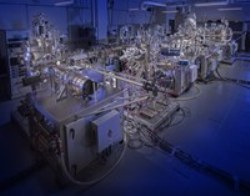Dec 13 2013
A first-of-its-kind, world-class laboratory that could lead to the creation of quantum materials for use in a new generation of technologies opened at the University of Waterloo’s Institute for Quantum Computing (IQC) today.
 The new deposition system in Professor Cory's lab will allow the investigation of new quantum materials.
The new deposition system in Professor Cory's lab will allow the investigation of new quantum materials.
Quantum materials are needed as the building blocks of robust quantum devices that will be able to function outside of laboratory settings bringing the possibility of a quantum computer one step closer.
“New materials are not conventional, so we need to take an unconventional approach to this research,” said Professor David Cory, Canada Excellence Research Chair in Quantum Information Processing. “The Institute for Quantum Computing has made a significant investment in quantum materials science and the most promising direction for building quantum devices is quantum materials.”
The lab houses a unique new $5 million tool to grow new materials that could form the building blocks of quantum technologies.
The tool, built by Omicron Instruments, features an ultra-high vacuum, multi-chamber design to grow high-quality thin films and layered structures. Thin film structures are at the heart of today’s electronics from computer chips to micro sensors.
The unique aspect of the new tool is the range of materials that can be grown within it – from oxides and metals to superconductors and topological insulators – a novel type of material exhibiting unique quantum behaviour. In typical deposition systems, magnetic materials are kept away from superconductors and topological insulators are separated from both magnets and superconductors. The new tool features molecular beam epitaxy and sputtering methods to grow the materials and researchers hope that this new regime will provide a new direction for the development of quantum materials.
“The Institute for Quantum Computing is proud to be the home of world-leading research,” said Professor Raymond Laflamme, executive director of IQC. “David Cory’s work in quantum materials, and the research of his colleagues here at IQC, is advancing our understanding of quantum information and its importance in the next generation of technology.”
This new lab further extends Professor Cory’s research program, which now totals over $40 million, and is an essential tool for fellow IQC Professor Guo-Xing Miao’s research on quantum materials and spintronics.
"Quantum science will shape the future of technology,” said Feridun Hamdullahpur, president and vice-chancellor of Waterloo. “The activities happening here at the University of Waterloo and the Institute for Quantum Computing, including Professor Cory's new lab, builds on our international presence for research excellence and we expect that the results will be an important step in building a pathway to the quantum world.”
The Government of Canada, Canada Foundation for Innovation, the Ontario Research Fund, industry partners and others helped fund the new lab.
"Our Government funds programs such as the Canada Excellence Research Chairs to break new ground in strategic areas of importance to Canadians," said Harold Albrecht, Member of Parliament for Kitchener-Conestoga. "Discoveries being made at global centres of excellence like Dr. David Cory’s lab here at the University of Waterloo, strengthen Canada’s overall research capacity. This creates new jobs and positions Canada at the cutting edge of innovation."
David Cory is a professor of chemistry in Waterloo’s Faculty of Science, deputy director, research at IQC and a member of the Waterloo Institute of Nanotechnology.